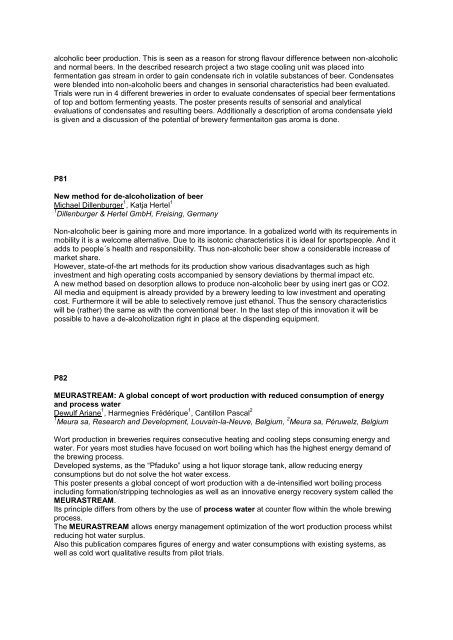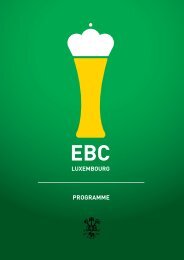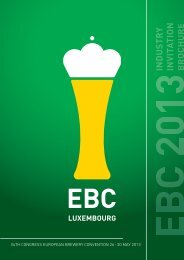here - the 34th European Brewery Convention
here - the 34th European Brewery Convention
here - the 34th European Brewery Convention
Create successful ePaper yourself
Turn your PDF publications into a flip-book with our unique Google optimized e-Paper software.
alcoholic beer production. This is seen as a reason for strong flavour difference between non-alcoholic<br />
and normal beers. In <strong>the</strong> described research project a two stage cooling unit was placed into<br />
fermentation gas stream in order to gain condensate rich in volatile substances of beer. Condensates<br />
were blended into non-alcoholic beers and changes in sensorial characteristics had been evaluated.<br />
Trials were run in 4 different breweries in order to evaluate condensates of special beer fermentations<br />
of top and bottom fermenting yeasts. The poster presents results of sensorial and analytical<br />
evaluations of condensates and resulting beers. Additionally a description of aroma condensate yield<br />
is given and a discussion of <strong>the</strong> potential of brewery fermentaiton gas aroma is done.<br />
P81<br />
New method for de-alcoholization of beer<br />
Michael Dillenburger 1 , Katja Hertel 1<br />
1 Dillenburger & Hertel GmbH, Freising, Germany<br />
Non-alcoholic beer is gaining more and more importance. In a gobalized world with its requirements in<br />
mobility it is a welcome alternative. Due to its isotonic characteristics it is ideal for sportspeople. And it<br />
adds to people´s health and responsibility. Thus non-alcoholic beer show a considerable increase of<br />
market share.<br />
However, state-of-<strong>the</strong> art methods for its production show various disadvantages such as high<br />
investment and high operating costs accompanied by sensory deviations by <strong>the</strong>rmal impact etc.<br />
A new method based on desorption allows to produce non-alcoholic beer by using inert gas or CO2.<br />
All media and equipment is already provided by a brewery leeding to low investment and operating<br />
cost. Fur<strong>the</strong>rmore it will be able to selectively remove just ethanol. Thus <strong>the</strong> sensory characteristics<br />
will be (ra<strong>the</strong>r) <strong>the</strong> same as with <strong>the</strong> conventional beer. In <strong>the</strong> last step of this innovation it will be<br />
possible to have a de-alcoholization right in place at <strong>the</strong> dispending equipment.<br />
P82<br />
MEURASTREAM: A global concept of wort production with reduced consumption of energy<br />
and process water<br />
Dewulf Ariane 1 , Harmegnies Frédérique 1 , Cantillon Pascal 2<br />
1 Meura sa, Research and Development, Louvain-la-Neuve, Belgium, 2 Meura sa, Péruwelz, Belgium<br />
Wort production in breweries requires consecutive heating and cooling steps consuming energy and<br />
water. For years most studies have focused on wort boiling which has <strong>the</strong> highest energy demand of<br />
<strong>the</strong> brewing process.<br />
Developed systems, as <strong>the</strong> “Pfaduko” using a hot liquor storage tank, allow reducing energy<br />
consumptions but do not solve <strong>the</strong> hot water excess.<br />
This poster presents a global concept of wort production with a de-intensified wort boiling process<br />
including formation/stripping technologies as well as an innovative energy recovery system called <strong>the</strong><br />
MEURASTREAM.<br />
Its principle differs from o<strong>the</strong>rs by <strong>the</strong> use of process water at counter flow within <strong>the</strong> whole brewing<br />
process.<br />
The MEURASTREAM allows energy management optimization of <strong>the</strong> wort production process whilst<br />
reducing hot water surplus.<br />
Also this publication compares figures of energy and water consumptions with existing systems, as<br />
well as cold wort qualitative results from pilot trials.





